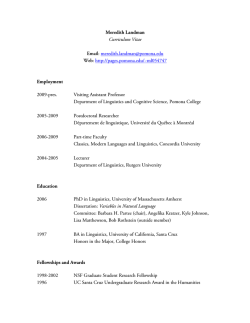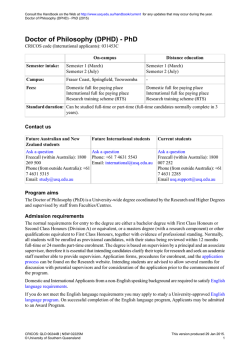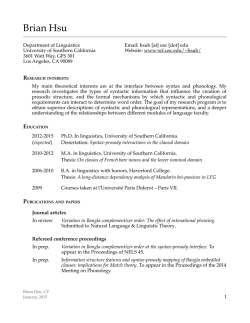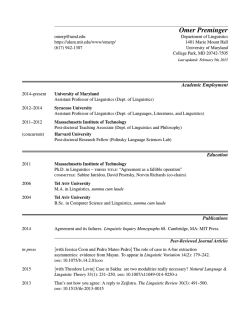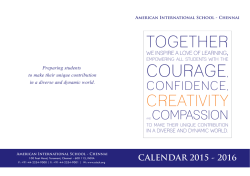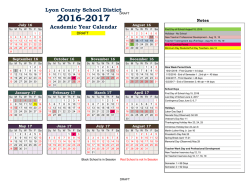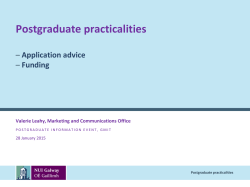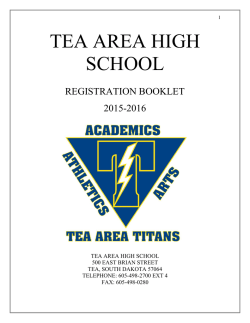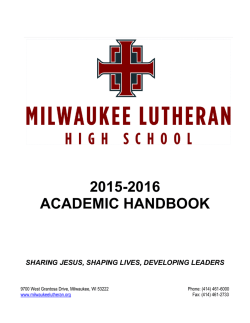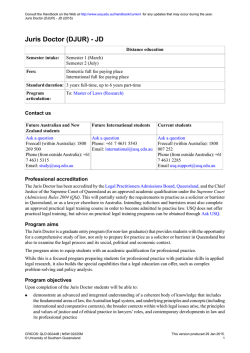
Master of Applied Linguistics - University of Southern Queensland
Consult the Handbook on the Web at http://www.usq.edu.au/handbook/current for any updates that may occur during the year. Master of Applied Linguistics (ends 2014) (MAPL) - MAppLing (2015) Master of Applied Linguistics (ends 2014) (MAPL) - MAppLing CRICOS code (International applicants): 021018E The Master of Applied Linguistics will accept no new admissions from Semester 1, 2015. This program will be replaced with a new 12–unit program from Semester 1, 2015. On-campus*# Online Semester intake: Semester 1 (March) Semester 2 (July) Semester 1 (March) Semester 2 (July) Semester 3 (November) Campus: Toowoomba - Fees: Domestic full fee paying place International full fee paying place Domestic full fee paying place International full fee paying place Standard duration: 1 year full-time, 5 years part-time on-campus, up to five years part-time online education, up to five years part-time online education Program articulation: From: Postgraduate Certificate of Applied Linguistics To: Doctor of Education Notes: From 2013, the Commonwealth Government will only support students in Masters programs who are studying one of the following three specialisations: Special Education TESOL Early Childhood. The Commonwealth Government will no longer provide any support for students who will be enrolled in Post Graduate Certificate programs. Those students who enrolled prior to 2013 with a Commonwealth Government Supported Place will be permitted to teach out their current program with Commonwealth Government Support. This program does not qualify students for teacher registration with relevant teaching authorities. To qualify for teacher registration in Queensland please refer to the ; Graduate Diploma of Learning and Teaching . Footnotes * All modes of study are supported with the USQ StudyDesk. It is possible to complete the program via a combination of delivery modes. # Should enrolments not reach the minimum number required for on-campus study, students may be transferred to the Online offering and advised of this change before semester commences. Contact us Current students Ask a question Freecall (within Australia): 1800 007 252 Phone (from outside Australia): +61 7 4631 2285 Email [email protected] Program objectives On successful completion of the Master of Applied Linguistics, graduates should be able to: ● ● ● ● ● critically reflect on language related issues and analyse their implications integrate knowledge and assess outcomes as a strategic facilitator in second language contexts expand communication management and multi-literacy skills assisted by technology in relevant discourse communities demonstrate enhanced competence in academic and scholarly writing use analytical skills in a specialised field of Applied Linguistics. Admission requirements Applicants must have completed a bachelor degree or equivalent from a recognised institution. CRICOS: QLD 00244B | NSW 02225M © University of Southern Queensland This version produced 29 Jan 2015. 1 Consult the Handbook on the Web at http://www.usq.edu.au/handbook/current for any updates that may occur during the year. Master of Applied Linguistics (ends 2014) (MAPL) - MAppLing (2015) Domestic and International Applicants from a non-English speaking background are required to satisfy English language requirements. If you do not meet the English language requirements you may apply to study a University-approved English language program. On successful completion of the English language program, Applicants may be admitted to an Award Program. Program fees Domestic full fee paying place Domestic full fee paying places are funded entirely through the full fees paid by the student. Full fees vary depending on the courses that are taken. You are able to calculate the fees for a particular course via the Course Fee Finder. Domestic full fee paying students may be eligible to defer their fees through a Government loan called FEEHELP provided they meet the residency and citizenship requirements. Australian citizens, Permanent Humanitarian Visa holders, Permanent Resident visa holders and New Zealand citizens who will be resident outside Australia for the duration of their program pay full tuition fees and are not eligible for FEE-Help. International full fee paying place International students pay full fees. Full fees vary depending on the courses that are taken and whether they are studied on-campus, via distance education/online. You are able to calculate the fees for a particular course via the Course Fee Finder. Program structure The Master of Applied Linguistics is an 8-unit program. A minimum of 50% of the program (4 units) must comprise courses at level 8. The program is offered in two strands: Community and Teaching. Both strands have a research pathway. The teaching strand also has a wholly coursework pathway. The Community strand embeds a research pathway and coursework, as shown in the following Table. Required Applied Linguistics courses LIN5000, EDR8005, LIN8015 3 units Required Research courses: EDR8000, EDR8061 3 units Optional Research courses: EDR8060 or EDR8001 1 unit Optional Elective postgraduate course See note 1 1 unit Note 1 Elective courses may be drawn from the Master of Education (8 Units) or from other USQ postgraduate programs. Contact the Faculty of Business, Education, Law and Arts to confirm suitability. TheTeaching Strand embeds a research or coursework pathway, as shown in the following Table. Research Coursework Required Applied Linguistics LIN5000, LIN8001, courses LIN8002 3 units LIN5000, LIN8001, LIN8002 3 units Elective Applied Linguistics LIN5003, EDR8005, courses LIN8006, LIN8007, LIN8015 2 units LIN5003, EDR8005, 4 units LIN8006, LIN8007, LIN8015 Required Research courses EDR8061, EDR8000 or EDU5713 3 units Optional Elective postgraduate course CRICOS: QLD 00244B | NSW 02225M © University of Southern Queensland See note 1 1 unit This version produced 29 Jan 2015. 2 Consult the Handbook on the Web at http://www.usq.edu.au/handbook/current for any updates that may occur during the year. Master of Applied Linguistics (ends 2014) (MAPL) - MAppLing (2015) Note 1 Elective courses may be drawn from the Master of Education (8 Units) or from other USQ postgraduate programs. Contact the Faculty of Business, Education, Law and Arts to confirm suitability. In some countries, completion of a research stream is a requirement for recognition of the Master's qualification. Those students in particular from Canada and the Middle East, or those intending to live and work there, should check registration requirements with the relevant authority in-country around the half-way point of the Master's program. This will allow time for students to complete their program via the research pathway if the need to do so is indicated. Program completion requirements Students are required to follow the recommended enrolment pattern to graduate with a Master of Applied Linguistics. Those who deviate from the recommended enrolment pattern are invited to transfer to the Master of Education (TESOL), a program with a less highly structured enrolment pattern containing all Applied Linguistics courses, or the Master of Learning and Development, a program that accommodates non-education courses. Required time limits Students have a maximum of 5 years to complete this program. Elective courses Elective courses will be selected from Education Other Disciplines * Select from the MED1 Master of Education (8 Units) Select courses from other USQ postgraduate programs Give priority to courses from the TESOL major: EDR8005 Discourse Analysis LIN8001 Principles of Second Language Learning LIN8002 Methodology in Teaching a Second Language LIN5003 Syllabus Design and Materials Writing LIN8006 Computer-Assisted Language Learning LIN8007 Language and Literacy Assessment LIN8015 Introduction to Sociolinguistics LIN8017 Bilingualism and Bilingual Education * Note: Minimum enrolment numbers apply to all courses. Should enrolments not meet the minimum number required, students may be transferred to a different mode or offering and advised of this change prior to semester start. * Contact the Faculty of Business, Education, Law and Arts to confirm suitability. IT requirements Students must have reliable and ready access to email and the Internet. See minimum computing standards for more information. Articulation The Master of Applied Linguistics program articulates from the Postgraduate Certificate in Applied Linguistics (PGAL). CRICOS: QLD 00244B | NSW 02225M © University of Southern Queensland This version produced 29 Jan 2015. 3 Consult the Handbook on the Web at http://www.usq.edu.au/handbook/current for any updates that may occur during the year. Master of Applied Linguistics (ends 2014) (MAPL) - MAppLing (2015) The Community Strand embeds the PGAL Community Strand. Articulating PGAL students will study 3 Required Research Courses and one of the Optional Research courses. The Teaching Strand embeds the PGAL Teaching Strand. Articulating PGAL students will study 3 Required Research Courses and one Elective course to complete their MAPL research pathway or 3-4 Applied Linguistics elective courses and optionally one postgraduate elective course to complete their MAPL coursework pathway. Exit points The Postgraduate Certificate in Applied Linguisicts (PGAL) and the Postgraduate Certificate in Learning and Development (PGLD) are optional exit points from the Masters with four relevant courses completed. Credit The maximum credit granted will be no more than half of the program units (four units). Within this limit, credit will be granted for relevant studies successfully completed at postgraduate level in the last five years and may be considered for studies successfully completed in the last 10 years. Students who have completed the Postgraduate Certificate programs listed in the Articulation section above, will receive full credit if they study the same specialisation in this program. Students intending to apply for credit should follow the guidelines for credit for previous study or work. Within the framework of those regulations, the following points should be given particular consideration: ● ● ● Transfer of credit from other incomplete USQ award programs may be permitted where there is similar or appropriate content. Normally an accredited Certificate in TESOL (e.g. the Cambridge Certificate in Teaching English to Speakers of Other Languages - CELTA) attracts 1 unit of credit and a Diploma in TESOL 2 units of credit. completed and assessed professional development modules based on PGAL course materials will attract credit into the program. Students should seek advice from the Faculty of Business, Education, Law and Arts before applying for credit. Students who have completed LIN5000 The Nature of Language or LIN8001 Principles of Second Language Learning or LIN8002 Methodology in Teaching a Second Language as part of an undergraduate program in the past 5 years are exempt from repeating the course but must complete electives in Applied Linguistics to gain 8-units for the award. Other information Assessment of the courses will involve one or more of the following components: written assignments, take-home examinations, reflective journal keeping, seminar presentation (where appropriate), report writing, development of work courses, questionnaires, marking schemes, etc. as appropriate to each course. Enrolment Students may commence this Program in semesters one, two or three. External students may choose to study part-time or full-time, or a combination of both at different stages of their program. On-campus commencement is restricted to semesters one and two. International on-campus students must be enrolled full-time. Community strand - Recommended enrolment pattern Students are able to enrol in any offered mode of a course (on-campus, distance education or online), regardless of the program mode of study they enrolled in. Graduates will have a clear sense of strategic direction for identifying linguistic differences in communities and assisting in the management of this diversity. It is recommended that CRICOS: QLD 00244B | NSW 02225M © University of Southern Queensland This version produced 29 Jan 2015. 4 Consult the Handbook on the Web at http://www.usq.edu.au/handbook/current for any updates that may occur during the year. Master of Applied Linguistics (ends 2014) (MAPL) - MAppLing (2015) ● the program of study commences with LIN5000 The Nature of Language Course Year of program and semester in which course is normally studied On-campus External Online (ONC) (EXT) (ONL) Year Sem Year Sem Year Sem Enrolment requirements Required LIN5000 The Nature of Language EDR8005 Discourse Analysis LIN8015 Introduction to Sociolinguistics EDR8000 Foundations of Contemporary Educational Research Methods EDR8061 Masters Project II 1 2 2 1, 2, 3 1 2 1, 3 1, 2 2, 3 1, 2, 3 1, 2, 3 Pre-requisite: EDR8000 and 4 units of com pleted Postgraduate Study and minimum GPA 5 Select a minimum of one unit EDR8060 Masters Project 1 EDR8001 Effective and Ethical Educational Research 1, 2 2 1, 2, 3 Pre-requisite: EDR8000 1, 2, 3 Select a maximum of one elective unit from the table of Elective courses Teaching strand - Recommended enrolment pattern Students are able to enrol in any offered mode of a course (on-campus, distance education or online), regardless of the program mode of study they enrolled in. Graduates will be competent in key areas for second language teaching in a range of contexts. This Strand enhances each student's capacity for open, critical reflective thinking about second language teaching practice by critically analysing relevant professional issues affecting current educational practices in the area of second language teaching and policy development. It is recommended that ● ● the program of study commences with LIN5000 The Nature of Language LIN8001 Principles of Second Language Learning is studied prior to LIN8002 Methodology in Teaching a Second Language Course Year of program and semester in which course is normally studied On-campus External Online (ONC) (EXT) (ONL) Year Sem Year Sem Year Sem Enrolment requirements Coursework pathway Required LIN5000 The Nature of Language LIN8001 Principles of Second Language Learning LIN8002 Methodology in Teaching a Second Language 1 1 1 1 2 1 1 1, 3 1, 2 2 Select minimum of 4 courses LIN5003 Syllabus Design and Materials Writing EDR8005 Discourse Analysis LIN8006 Computer-Assisted Language Learning LIN8007 Language and Literacy Assessment LIN8015 Introduction to Sociolinguistics LIN8017 Bilingualism and Bilingual Education CRICOS: QLD 00244B | NSW 02225M © University of Southern Queensland 2 2 2 1 3 Pre-requisite: LIN5000 and LIN8001 1, 2 1, 2 1, 3 2, 3 1 This version produced 29 Jan 2015. 5 Consult the Handbook on the Web at http://www.usq.edu.au/handbook/current for any updates that may occur during the year. Master of Applied Linguistics (ends 2014) (MAPL) - MAppLing (2015) Course Year of program and semester in which course is normally studied On-campus External Online (ONC) (EXT) (ONL) Year Sem Year Sem Year Sem Enrolment requirements Select a maximum of one elective unit from the table of Elective Courses To best position yourself for later PhD studies, the Research pathway is recommended Research pathway Required LIN5000 The Nature of Language LIN8001 Principles of Second Language Learning LIN8002 Methodology in Teaching a Second Language 1 1 1 1 2 1 1 1, 3 1, 2 2 Select minimum of two courses from LIN5003 Syllabus Design and Materials Writing EDR8005 Discourse Analysis LIN8006 Computer-Assisted Language Learning LIN8007 Language and Literacy Assessment LIN8015 Introduction to Sociolinguistics LIN8017 Bilingualism and Bilingual Education 3 Pre-requisite: LIN5000 and LIN8001 1, 2 1, 2 1, 3 2, 3 1 2 2 2 1 Research course: EDR8000 Foundations of Contemporary Educational Research Methods 1, 2, 3 1 1, 2, 3 Required project work EDR8061 Masters Project II 2 1, 2, 3 Pre-requisite: EDR8000 and 4 units of com pleted Postgraduate Study and minimum GPA 5 Notes: On campus offers are contingent upon sufficient enrolments. Subject to International Student visa requirements, alternative modes of EXT or WEB may be substituted. CRICOS: QLD 00244B | NSW 02225M © University of Southern Queensland This version produced 29 Jan 2015. 6
© Copyright 2026
